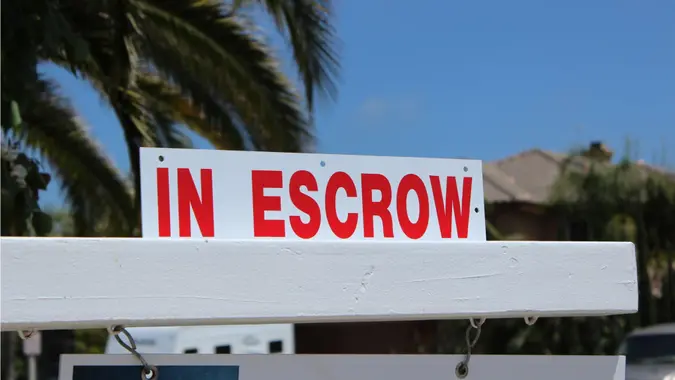I’m a Real Estate Agent: Don’t Close Escrow at This Time of the Month

Commitment to Our Readers
GOBankingRates' editorial team is committed to bringing you unbiased reviews and information. We use data-driven methodologies to evaluate financial products and services - our reviews and ratings are not influenced by advertisers. You can read more about our editorial guidelines and our products and services review methodology.

20 Years
Helping You Live Richer

Reviewed
by Experts

Trusted by
Millions of Readers
So you’re finally making an offer on a home — or maybe your offer was already accepted. Congratulations!
But now you need to set the closing date, and you’re not sure when is the best time to close on your home. There are many things to consider, including when your first payment is due, how taxes and interest are charged and how prorating works.
We chatted with a few licensed real estate agents to get their takes on the ideal time to close escrow on your new home. We talked about the best (and worst) time to close escrow — and why timing matters.
It’s Not as Simple as ‘Picking the Right Date’
When closing escrow on your new home purchase, it’s not a straightforward answer. It depends on your priorities as well as your financial situation.
“There isn’t a one-size-fits-all answer to optimizing your payment when closing escrow on a home,” said Mike Qiu, licensed real estate agent and owner of Good As Sold Home Buyers.
And while buyers may have some wiggle room on when to close — this decision may be influenced by the seller, especially if part of the agreement to sell the home requires a fast closing.
But if you do get to choose exactly when to close escrow, here’s what experts say.
Consider Prorated Taxes, Interest and Insurance Costs
Closing on a home doesn’t always happen on the first of the month. This means you’ll need to pay prorated costs for things like taxes and insurance.
“When you close, you’re responsible for a portion of the property taxes and homeowner’s insurance that the seller already paid for the year,” Qiu said. “This is prorated based on the closing date. Similarly, you’ll owe interest on your mortgage from the closing date to your first payment due date.”
You can save a few bucks by closing later in the month, thereby paying less in prorated costs.
“Target the month’s end: Closing towards the end of the month (around 25th-30th) can minimize the prorated interest you pay,” Qiu said. “However, this might be challenging depending on scheduling with other parties involved.”
Nick Hedberg, licensed real estate agent and owner of As-Is Home Buyer, agreed with Qui.
“Aim for closing escrow towards the tail-end of the month,” Hedberg said. “It comes down to minimizing those pesky prepaid interest charges. From the day you close until your first full mortgage payment is due, you have to prepay the interest upfront. So the earlier in the month you close, the more of those interest charges you will cut down. But close, say, on the 28th and you are only covering like 2-3 days’ worth.”
Timing Your First Mortgage Payment
Another consideration for setting your closing date is the timing of your first mortgage payment. You typically don’t start paying on your mortgage until after one month of living there. This means if you close earlier in the month, you can potentially have no payment for almost two full months.
But you’ll also have to prepay for all the interest that first month, which can be costlier.
“Closing early in the month means you’ll pay more prorated interest for the remaining days,” Qui said.
And in some cases, you still won’t be moved in, but have to pay the extra interest anyway.
“If you close on a home on the 5th of the month, more than likely, your first actual mortgage payment would not be due until the 1st of the following month,” Hedberg said. “So you have to pay the interest upfront for that entire period that you were not even living there yet.”
Things To Consider Before Setting a Closing Date
Here are some things to consider to minimize your closing costs:
You May Be Able To Negotiate Extra Expenses
If you want to close earlier in the month to push your first payment out further — but don’t like the idea of prepaid expenses — you might be able to get the seller to help.
“Sometimes, you can negotiate with the seller to cover some prepaid expenses like interest or property taxes,” Qui said.
End of Month Closing Is Ideal but Not Always Possible
To save on extra expenses upfront, closing toward the end of the month is ideal. But it’s not always in the cards for homebuyers, so while you can aim for it, you also have to be realistic.
Bottom Line
When you close escrow can have a direct impact on your wallet, but it’s not a one-size-fits-all choice. You need to know what your priorities are (less prepaid costs or a later mortgage payment date) and what is possible.
Remember, purchasing your home involves two parties, and you need to work with the seller to find a date that works.
And working with a professional real estate team can help.
“Consulting with your lender and real estate agent is key,” Qui said. “They can analyze your situation and recommend the best closing date based on your loan terms and potential savings on prorated items.”
 Written by
Written by  Edited by
Edited by 

























